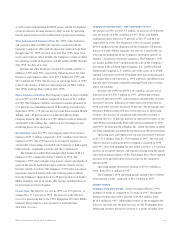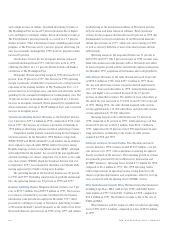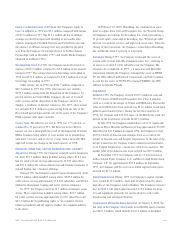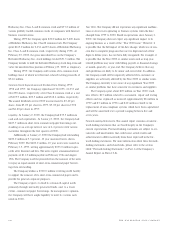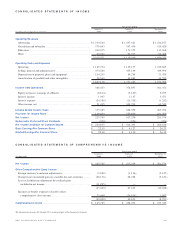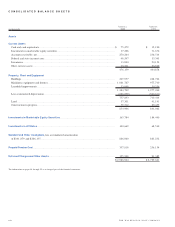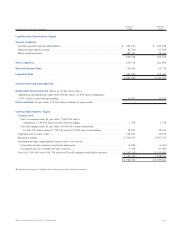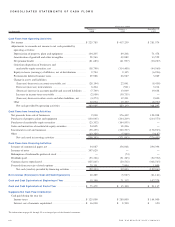Washington Post 1999 Annual Report Download - page 14
Download and view the complete annual report
Please find page 14 of the 1999 Washington Post annual report below. You can navigate through the pages in the report by either clicking on the pages listed below, or by using the keyword search tool below to find specific information within the annual report.
temporary differences between the carrying amounts and tax
bases of assets and liabilities.
Foreign Currency Translation. Gains and losses on foreign currency
transactions and the translation of the accounts of the Company’s
foreign operations where the U.S. dollar is the functional currency
are recognized currently in the Consolidated Statements of Income.
Gains and losses on translation of the accounts of the Company’s
foreign operations where the local currency is the functional cur-
rency and the Company’s equity investments in its foreign affiliates
are accumulated and reported as a separate component of equity
and comprehensive income.
Stock-Based Compensation. The Company accounts for stock-based
compensation using the intrinsic value method prescribed by
Accounting Principles Board Opinion No. 25, “Accounting for Stock
Issued to Employees.” Pro forma disclosures of net income and
earnings per share as if the fair-value based method prescribed by
Statement of Financial Accounting Standards (SFAS) No. 123,
“Accounting for Stock-Based Compensation” had been applied in
measuring compensation expense are provided in Note H.
Sale of Subsidiary Securities. The Company’s policy is to record
investment basis gains arising from the sale of equity interests in
subsidiaries that are in the early stages of building their operations
as additional paid in capital, net of taxes.
B. ACCOUNTS RECEIVABLE AND ACCOUNTS PAYABLE
AND ACCRUED LIABILITIES
Accounts receivable at January 2, 2000 and January 3, 1999
consist of the following (in thousands):
1999 1998
Trade accounts receivable, less estimated
returns, doubtful accounts and
allowances of $60,621 and $55,050 .........$248,279 $216,500
Other accounts receivable........................ 21,985 20,014
$ 270,264 $ 236,514
Accounts payable and accrued liabilities at January 2, 2000
and January 3, 1999 consist of the following (in thousands):
1999 1998
Accounts payable and accrued expenses .......$158,197 $170,018
Accrued payroll and related benefits............ 58,420 55,133
Deferred tuition revenue ......................... 28,060 13,166
Due to affiliates (newsprint)...................... 9,428 6,751
$ 254,105 $ 245,068
C. INVESTMENTS IN MARKETABLE EQUITY SECURITIES
Investments in marketable equity securities at January 2, 2000 and
January 3, 1999 consist of the following (in thousands):
1999 1998
Total cost ..........................................$194,364 $187,297
Net unrealized gains .............................. 8,648 68,819
Total fair value ....................................$203,012 $256,116
At January 2, 2000, the Company’s ownership of 2,634 shares
of Berkshire Hathaway, Inc. (“Berkshire”) Class A common stock
and 9,845 shares of Berkshire Class B common stock accounted for
$165,800,000 or 82 percent of the total fair value of the Company’s
investments in marketable equity securities. The remaining invest-
ments in marketable equity securities at January 2, 2000 consist
of common stock investments in various publicly traded companies,
most of which have concentrations in Internet business activities.
In most cases, the Company obtained ownership of these common
stocks as a result of merger or acquisition transactions in which
these companies merged or acquired various small Internet related
companies in which the Company held minor investments.
Berkshire is a holding company owning subsidiaries engaged in
a number of diverse business activities; the most significant of which
consist of property and casualty insurance business conducted on
both a direct and reinsurance basis. Berkshire also owns approxi-
mately 18 percent of the common stock of the Company. The chair-
man, chief executive officer and largest shareholder of Berkshire,
Mr. Warren Buffett, is a member of the Company’s Board of
Directors. Neither Berkshire nor Mr. Buffett participated in the
Company’s evaluation, approval or execution of its decision to invest
in Berkshire common stock. The Company’s investment in Berkshire
common stock is less than 1 percent of the consolidated equity of
Berkshire. At present, the Company intends to hold the Berkshire
common stock investment long-term; thus this investment has been
classified as a non-current asset in the Consolidated Balance Sheets.
At January 2, 2000, net unrealized gains consisted of unrealized
gains totaling $27,782,000 on various common stock investments off-
set in part by $19,134,000 in unrealized losses on the company’s
investment in Berskshire common stock. The company intends to hold
the Berkshire common stock investment long-term and views the
unrealized loss position at January 2,000 as temporary.
During 1999 and 1998, proceeds from sales of marketable
equity securities were $54,805,000 and $38,246,000, respectively,
and gross realized gains on such sales were $38,799,000 and
$2,168,000, respectively. There were no sales of marketable equity
securities during 1997. Gross realized gains or losses upon the sale
of marketable equity securities are included in “Other income, net”
in the Consolidated Statements of Income. For purposes of comput-
45THE WASHINGTON POST COMPANY


